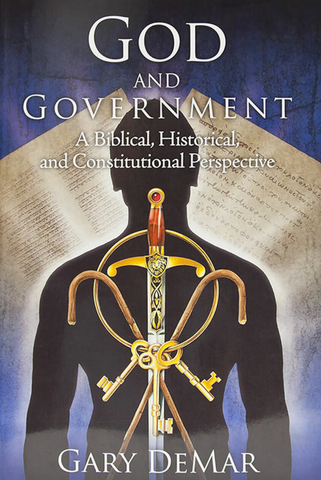Please help us reach $10K in donations for a matching grant
Discussions about “dominion” have taken a wild turn based on Christian Nationalism, a designation I do not like. Dominion theology is equated to ‘Christian Nationalism.’ Here’s one example: “With a burgeoning interest in the idea of Christian Nationalism, the Christian Church in America has seen a renewed interest in modified versions of theonomy.” If “modified versions of theonomy” are in operation, it would be best to obtain an accurate description and application of theonomy. One thing a well-informed theonomist would tell you is that politics is fourth behind self-government, family government, and church government.
D. James Kennedy, the late Senior Pastor of Coral Ridge Presbyterian Church, was a vocal advocate of what he and others have called the “cultural mandate.” He defined it this way:
As the vice-regents of God, we are to bring His truth and His will to bear on every sphere of our world and our society. We are to exercise godly dominion and influence over our neighborhoods, our schools, our government, our literature and arts, our sports arenas, our entertainment media, our news media, our scientific endeavors—in short, over every aspect and institution of human society.[1]
So then, there is nothing unusual about advocating dominion based on Genesis 1:26-28. Even some dispensationalists support it (see Does the Church Win by Losing?).
Contrary to critics, Christian Reconstructionists have seen a relationship between the “dominion mandate” of Genesis and the Great Commission of Matthew 28:18-20. Dr. Harold John Ockenga, in his Introduction to Carl F. H. Henry’s The Uneasy Conscience of Modern Fundamentalism, wrote the following (note the date) in 1947:
A Christian world- and life-view embracing world questions, societal needs, personal education ought to rise out of Matt. 28:18-21 as much as evangelism does. Culture depends on such a view, and Fundamentalism is prodigally dissipating the Christian culture accretion of centuries, a serious sin. A sorry answer lies in the abandonment of social fields to the secularist.[2]
As you probably know, there is a lot more literature on this topic. The above sources immediately come to mind. With a little more research, I could find a lot more.[3] But, of course, this does nothing to refute Robert Bowman’s assertion that there is no such mandate. Just because other theologians believe the Bible teaches a doctrine does not make it true. It’s a bit misleading, however, in leaving the impression that the Dominion Mandate is a manufactured doctrine of Reconstructionism.

Restoring the Foundation of Civilization
There are many Christians who will not participate in civilization-building efforts that include economics, journalism, politics, education, and science because they believe (or have been taught to believe) these areas of thought are outside the realm of what constitutes a Christian worldview. Nothing could be further from the truth.
Buy NowDominion is an “inescapable concept.” Dominion will be exercised. The question is: “What standard will be used to ‘take dominion’”? Rushdoony writes: “Dominion does not disappear when a man renounces it; it is simply transferred to another person, perhaps to his wife, children, employer, or the state. Where the individual surrenders his due dominion, where the family abdicates it, and the worker and employer reduce it, there another party, usually the state, concentrates dominion. Where organized society surrenders power, the mob gains it proportionate to the surrender.”[4] Bowman asks whether Christians are “supposed to take dominion.” When Reconstructionists talk about “taking dominion,” they mean exercising dominion according to biblical norms rather than humanistic ones. Bowman continues with another misconception:
[The claim of a dominion mandate] does not bear close scrutiny of the texts. In Genesis 1:28 God gives dominion over the animal kingdom to man.
Mr. Bowman did not scrutinize the first few chapters of Genesis very carefully. God created the earth for His image-bearers to live and act on their special status. He didn’t create the earth for the plants, minerals, and animals to dominate the world. God gives dominion over the entire creation to His image bearers, not only the animal kingdom. These created entities were given to serve God’s highest creation: “And God blessed them [Adam and Eve]; and God said to them, ‘Be fruitful and multiply, and fill the earth, and subdue it; and rule over the fish of the sea and over the birds of the sky, and over every living thing that moves on the earth’” (Gen. 1:28). There are two aspects of God’s command relating to dominion: subdue and fill the earth and rule over the animals. So then, all the earth’s potentialities are legitimate, even mandated, domains for our activity. This is why the “dominion mandate” is often described as the “cultural” or “creation mandate.” Culture is the object. This includes art, music, literature, technology, and the sciences. The Bible serves as the standard for exploring these potentialities.
Psalm 8 reiterates the dominion mandate of Genesis by telling us that “Thou dost make him to rule over the works of Thy hands” (8:6). Included in the works of man’s hands, but not limited to them, is the animal creation. In his commentary on the Psalms, Leupold writes of Psalm 8:6: “How much [‘the works of Thy hands’] involves neither this statement nor Gen. 1 specifies, but it certainly cannot indicate a mere nominal control, for the parallel statement of v. 6 … extends man’s authority to ‘everything’ and … claims that these things may be said to have been ‘put under his feet.’”[5]
The Bible gives instructions on each of the following subjects, all considered the domain of Christians: civil government, the judicial system, economics, indebtedness, the punishment of criminals, foreign affairs, care for the poor, animal husbandry, ecology, journalism, science, medicine, business, education, taxation, inflation, property, terrorism, war, peace negotiations, military defense, ethical issues like abortion and homosexuality, environmental concerns, inheritance, investments, building safety, banking, child discipline, pollution, marriage, contracts, and many other worldview issues.[6] This is the dominion mandate. If God instructs us on an issue, then we are mandated to follow those commands according to His Law in every area of life. This is true for non-believers as well.
There is something James Jordan defines as the “Dominion Trap.”
There is, however, a precondition for such dominion: Godliness. When Adam rebelled against God, he was cast out of the Garden, and lost much of his dominion privilege. Men who do not repent eventually lose all dominion by being consigned to hell.
Godliness, in the sense we are speaking of here, is not an instant affair, however. It is not a matter of saying, “Well, now you are a Christian. Go out and take dominion!” Such a simplistic formula is fraught with spiritual danger, and the history of Christian social movements illustrates it well….
What the Bible actually teaches is that spiritual maturity or wisdom results from a process of growth, and it is the precondition for dominion all along the way. This is fairly obvious to us if we think of children. We expect our children to grow and become mature and wise before we burden them with adult, dominion tasks. To load such a burden on a child would be to crush him. For a child to presume to take such adult responsibilities on himself would be arrogant and destructive. We don’t wish, after all, to be ruled by children.
The author of the letter to the Hebrews makes the point that maturity takes time. Christians in his day were not equipped for anything more challenging than what a nursing baby would be able to do. Maturity takes time, experience, and practice.
Concerning [Melchizedek] we have much to say, and it is difficult to explain, since you have become poor listeners. For though by this time you ought to be teachers, you have need again for someone to teach you the beginning [ἀρχῆς] principles [στοιχεῖα] of the actual words of God, and you have come to need milk and not solid food. For everyone who partakes only of milk is unacquainted with the word of righteousness, for he is an infant. But solid food is for the mature, who because of practice have their senses trained to distinguish between good and evil (Heb. 5:11-14).
If we can’t get basic principles of God’s Word right in terms of ourselves, how will we be able to apply them to the broader world? The starting point for dominion is self-government.

God and Government
With a fresh new look, more images, an extensive subject and scripture index, and an updated bibliography, God and Government is ready to prepare a whole new generation to take on the political and religious battles confronting Christians today. May it be used in a new awakening of Christians in America—not just to inform minds, but to stimulate action and secure a better tomorrow for our posterity.
Buy Now[1] D. James Kennedy, Led by the Carpenter: Finding God’s Purpose for Your Life (Nashville: Thomas Nelson Publishers, 1999), 7.
[2] Harold J. Ockenga, “Introduction,” in Carl F. H. Henry, The Uneasy Conscience of Modern Fundamentalism (Grand Rapids, MI: Eerdmans, 1947), 14.
[3] For example, J. Gresham Machen, “Christianity and Culture,” originally published in The Princeton Theological Review, Vol. IX, 1913 and Henry R. Van Til, The Calvinistic Concept of Culture (Grand Rapids, MI: Baker Book House, 1959). See my three chapters in Theonomy: An Informed Response.
[4] Rousas J. Rushdoony, The Institutes of Biblical Law (Nutley, NJ: The Craig Press, 1973), 448.
[5] H. C. Leupold, Exposition on Psalms (Grand Rapids, MI: Baker Book House, [1959] 1977), 104-105.
[6] For a comprehensive discussion of most of these topics see Gary DeMar, God and Government, one-vol. ed. (Powder Spring, GA: American Vision, 2011).

